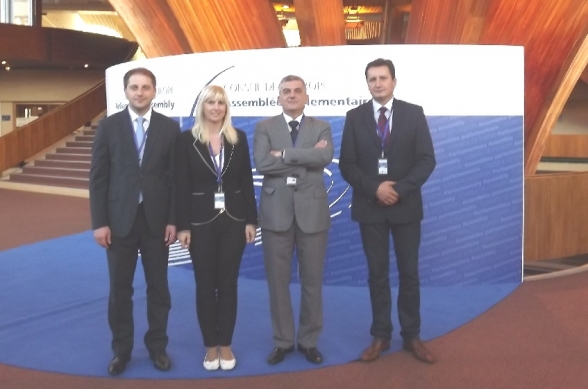Parliamentary Assembly of the Council of Europe supported the proposal to proclaim 22 July -the day of the massacre of young people in Oslo and the island Utoya, as the European Day devoted to victims of hate crimes. Fight against hatred and insults to human dignity, with the promotion of equality are the main principles of the Council of Europe and all member states should advocate for those values, pointed out the President of the Norwegian Parliament during participation in the plenary session. He stated that the hatred should be decreased, and not contributed to its spreading. In today adopted Resolution, the Parliamentary Assembly called on politicians to start a debate with neo-Nazis and expose them to the public, with a clear and unambiguous condemnation and rejection of neo-Nazi ideology and rhetoric. It was pointed to a number of positive examples in Europe undertaken in the fight against neo-Nazism, including activities aimed at preventing young people to become part of the neo-Nazi movements, as well as a series of laws adopted against hate speech and hate crimes.
On the occasion of the fight against hate speech and combating extremism, a number of victims of extremism and hate speech gathered today in the Parliamentary Assembly of the Council of Europe who expressed readiness to inform visitors about their own experience. President of the Parliamentary Assembly of the Council of Europe, President of the Norwegian Parliament and Secretary General of the Council of Europe spoke at the opening of the event and it was attended by members of parliament, members of national delegations to PACE.
In the afternoon, there was a discussion on women's rights and perspectives of Euro-Mediterranean cooperation. It was concluded that it was necessary to strengthen cooperation in order to improve the position of women in the South-Mediterranean countries. Three years after the Arab Spring, Parliamentary Assembly of the Council of Europe assessed that there was a varied picture in terms of respect for the rights of women and their position in society in these countries. Namely, while significant progress was made in Tunisia and Morocco in the field of women's rights, there is no notable progress in Libya and Egypt, while in Algeria the progress is not satisfactory. In today adopted Resolution, based on the Report of the Rapporteur from Belgium, PACE advised these countries to adopt and take concrete measures to improve the status of women. Primarily, it calls for the implementation of the principle of equality, particularly in the field of family and inheritance law. Also, it is necessary to promote the participation of women in political life and to take measures to reduce domestic violence and violence against women. It is recommended that civil society should be involved in creating and implementing policies that should contribute to enhancing the status of women. Also, the authorities in these countries have been invited to establish closer cooperation with the Council of Europe, in the framework of the "Partnership for Democracy" and "Southern program."
Also, discussion at the PACE plenary session was about improving the quality of education as well as vocational education, specialization and training. It was stressed that member states of the Council of Europe are making significant efforts to improve education, but it is necessary to innovate educational policies and specific strategies in order that European system of education could be competitive globally. Member States are invited to establish mechanisms for monitoring and evaluating the quality of education, and to take action to reduce the level of school dropout, promotion of equality and professionalism of the teaching staff, implementation of ethical standards and democratic governance of educational institutions. It was assessed that the Council of Europe should encourage and facilitate cooperation between international organizations and professional networks and agencies involved in improving the quality of education. The importance of continuous professional development of staff was stressed in order to be competitive in the labor market. Given that the technology is rapidly evolving, Europe needs workers who would be willing to constantly improve and undergo a number of training programs in order to meet the requirements of the labor market.
Members of the Delegation of the Parliament of Montenegro in the Parliamentary Assembly of the Council of Europe participated in the morning and afternoon sessions of working bodies of PACE: Committee on Political Affairs and Democracy, Committee on Culture, Science, Education and Media, Committee on Migration, Refugees and Displaced Persons, Committee on Equality and Non-Discrimination and the Committee on social Affairs, Health and Sustainable Development.
The session will be continued tomorrow with discussions about the activities of the Organization for Economic Cooperation and Development for 2013-2014, the functioning of democratic institutions in Georgia and the crisis in Ukraine.
Montenegrin delegation at the Autumn Session is composed of: Predrag Sekulić PhD, Damir Šehović MA, Mladen Bojanić and Snežana Jonica.








